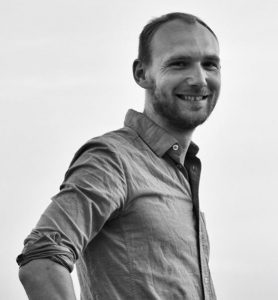I work to provide advice on noise and vibration in the built environment. My job is varied: one day I could be working in the office writing about noise in an Environmental Statement for a new development, the next I could be attending meetings on-site to present the design strategy to minimise noise. On the same day I could even be measuring the vibration from a demolition project situated next to a 5000-year-old ancient artefact! (I have been very fortunate to advise some of the top UK museums on how to prevent vibration from construction work damaging their priceless collections.)
How did you get into acoustics?
In my teenage years I was fortunate to work in Polish Radio and was fascinated with recording studios and audio equipment used in the process of making programmes, so I decided to pursue a career in audio production. However, life quickly confirmed my talent (or lack thereof) and I realised a career in recording studios was not for me. Luckily, one of the modules [on my HND], Acoustic Principles, turned the topic into the most interesting story. It was an introduction to basics of acoustic building design and included examples from BBC and Granada studios. I was hooked.
What did you study to get into acoustics?
Acoustics! I graduated with a bachelor’s degree in Acoustics from the University of Salford. I also later completed a Masters in Structural Engineering.
What do you love about your job?
The main reason I enjoy my job is because it includes a combination of creativity, science and engineering.
I love the investigative aspects, which require me to carry out noise and vibration measurements on site. I then analyse and interpret the results to diagnose problem. Finally, through engineering judgment, I then recommend what should be done to reduce the problem. Certain situations get especially interesting when the problems are not immediately obvious, and solutions require thinking outside the box. This is the creative part of acoustic engineering.
What is most challenging aspect of your job?
Night-time surveys in the middle of winter! Luckily these are not very often…
What are the most important skills to have in your job?
Interpersonal written and spoken communication, a keen willingness to learn, patience (although this is a skill I have personally had to learn on the job) and problem solving – knowing a thing or two about Maths also helps.
What’s one of the most exciting projects you’ve ever done?
I worked on how to monitor construction noise at The Royal Opera House. Opera artists produce sound themselves and so we couldn’t use a traditional measurement as it would have been impossible (on paper) to distinguish between the sound of talented musicians and an adjacent jack-hammer. Therefore, we proposed a unique way of monitoring noise by vibration measurements specifically for this client.
How does your work make a difference to peoples’ lives?
High and frequent noise levels can lead to stress and reduced health. Good acoustic design improves personal well-being both at work and at home. Better designed homes and buildings last longer and therefore are more sustainable as they are less likely to be demolished and replaced with something “better”.
